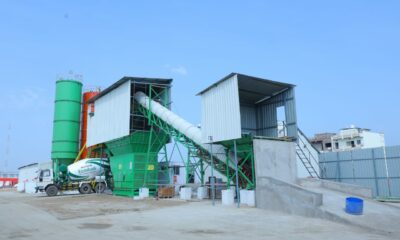Guest Column
Warehousing to get push from growing manufacturing


The pandemic has pushed businesses to transform, across the globe. During this, the businesses which were outsourcing their products from the international partners, have now shifted their focus on manufacturing them in their own countries. The countries like India have up their game by creating a blueprint to build on its potential and make the nation world’s next manufacturing hub.
The recent move to start manufacturing their products in India by two of the world’s biggest corporate giants in technology and green mobility is a testimony to the transformation of the manufacturing industry. This in return is creating more demands for warehousing units from established and reliable real estate players.
The Government of India has also been working towards introducing the new policies that will fuel this development. The policy framework with respect to Smart Cities, Digital India, Make in India, VocallforLocal, Atmanirbhar Bharat etc., have motivated the businesses to explore India as a market for setting up their manufacturing base. Moreover, with increased consumption from the aspirational consumers in the country, there has been an evident growth in retail, e-commerce, manufacturing and warehousing.
Enhanced connectivity creating more possibilities
The Ministry of Road Transport and Highways had launched Bharatmala Pariyojana with an aim to develop the road connectivity to Border areas, development of Coastal roads including road connectivity for Non-Major ports, improvement in the efficiency of National Corridors, development of Economic Corridors, Inter Corridors and Feeder Routes along with integration with Sagarmala, etc.
During the Union Budget session on February 1, 2021, the Finance Minister announced investments towards enhanced road and railway connectivity in the country. This move will further add on to the developing economy of India. Additionally, industrial freight corridors across tier 2 and 3 cities, has significantly increased the possibility for multi- location warehouses. Smaller markets such as Hosur, Coimbatore, Vapi, Gurugram, Guwahati, Ludhiana, Surat, Patna, Bhubaneshwar, Siliguri and Lucknow have promising potential for warehousing business. With well-established and structured warehouses to access, the consumer driven companies are thriving over faster deliveries and seamless procurement of goods.
Towns like Hosur in Tamil Nadu and Bilaspur in Haryana are one of the most popular hubs for warehousing. The close proximity with major metro cities has compelled companies to set up their manufacturing units in these cities, who would need logistic and warehousing support.
Increased demand from the consumers catalysing local manufacturing
The Indian Brand Equity Foundation reports, ‘Manufacturing has emerged as one of the high growth sectors in India. Prime Minister of India, Mr Narendra Modi, launched the ‘Make in India’ program to place India on the world map as a manufacturing hub and give global recognition to the Indian economy. Government aims to create 100 million new jobs in the sector by 2022.’
The growth of warehousing businesses is directly proportional to the growth of businesses across sectors, especially ecommerce and local manufacturing. These sub sectors are dependent on warehousing services to stay afloat in the market and optimise their cost of delivery from the factory to the end consumer.
Ecommerce platforms are strategically partnering with relevant service providers in warehousing to cater to their manufacturing partners and match growing customer expectations as well.
While there will be new entrants in the warehousing category to explore the booming industry, early adopters to advance technology and credible names in the market will have an advantage. Today, warehousing is not just a product but a holistic service. The companies which can provide Grade A services to their customers and assist them in better access to the best services, will lead this growth. Technology will play a vital role in changing the game. Remote monitoring, real time assistance to clients, transparent tracking and stock maintaining systems and security of goods will be primary. With horizontal growth, the warehousing companies will also have to innovate their offerings and focus on vertical growth to stay relevant and deliver value to their customers.
-



 News4 weeks ago
News4 weeks agoKW Delhi 6 Mall Onboards New Brands
-



 News4 weeks ago
News4 weeks agoManasum Senior Living Launches IKIGAI GOA, A Senior Living Community in North Goa, in collaboration with Prescon Homes
-



 News4 weeks ago
News4 weeks agoCommercial Realty Gets Tech Savvy: Fast Construction, Enhanced Convenience
-





 News3 weeks ago
News3 weeks agoGodrej Properties Sells Rs 3k cr+ Homes of Godrej Zenith, Gurugram, within 3 days
-



 News4 weeks ago
News4 weeks agoBridging India Divide: Top 5 Tier- 2 Cities to Focus On
-



 News4 weeks ago
News4 weeks agoMultipoint Connection – A Definite Boon
-



 News3 weeks ago
News3 weeks agoRBI’s Status Quo on Key Policy Rates to Help Maintain the Real Estate Growth Momentum, Say Industry Stalwarts
-



 News1 week ago
News1 week agoOlive Announces Dhruv Kalro as Co-Founder



























